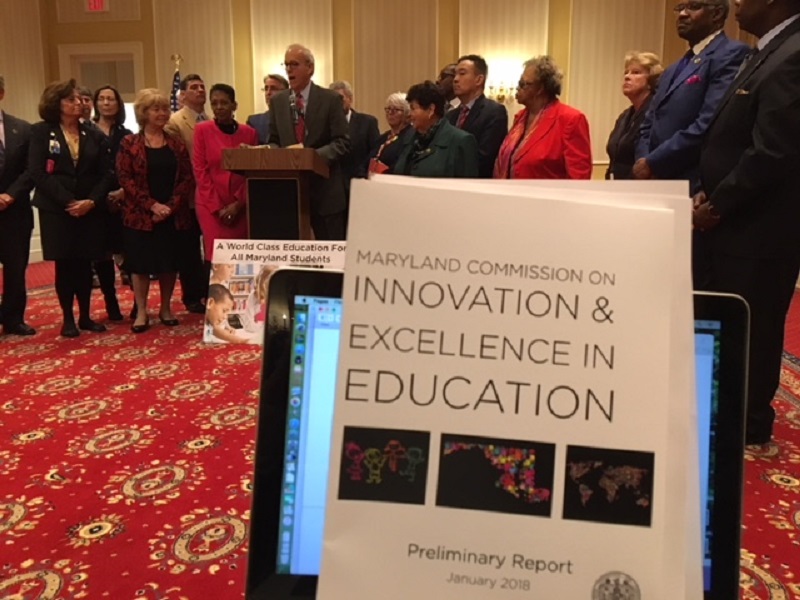Kirwan Commission Won’t Release Final Report on Education Until After Elections
A state commission has released preliminary recommendations on how to improve education in Maryland but won’t issue its final report — or its price tag — until after the November elections, a move an aide to Gov. Lawrence J. Hogan denounced as “politics.”
The Maryland Commission on Innovation and Excellence in Education — known as the Kirwan Commission — is calling on the state to boost funding for schools serving low-income communities, encourage top high school graduates to become teachers and expand pre-kindergarten programs, among other recommendations.

The Kirwan Commission is calling on the state to boost funding for schools serving low-income communities. The commission’s final report won’t be issued until after the November elections. Photo by Bruce DePuyt
“Based on the National Assessment of Education Program, Maryland is in the middle of the pack, at best,” commission Chairman William E. “Brit” Kirwan said at a press conference. “[We have] achievement gaps based on race and socio-economic status that are unacceptable.”
“The harsh reality is Maryland schools at present are a long, long way from being the best in the world,” said Kirwan, former chancellor of the University of Maryland.
The commission, which was formed in late 2016, was expected to issue recommendations in time for this year’s session, but a bill introduced by legislative leaders Wednesday would extend the panel’s deadline to Dec. 31.
“We had to develop and get agreement on the policy areas,” Kirwan said. “Now we can get into areas of finance, and we’re going to get right on that over the next several months.”
Douglass Mayer, chief spokesman for Hogan (R), questioned the motives behind the delay. “For three years we were hearing that the Kirwan Commission would make funding recommendations and then all of a sudden, out of the blue, they decided not to do that. And they didn’t really explain why.”
Mayer said the fear of alienating voters in Montgomery County, the state’s largest political subdivision, prompted this week’s action.
“There are political operatives and other types of folks involved in making these decisions,” he told Maryland Matters. “They punted because they know that any recommendation they make is going to remove funds from Montgomery County and move them to other parts of the state, and that was untenable for them in an election year.”
Del. Adrienne A. Jones (D-Baltimore), the speaker pro tem and a member of the commission, sharply rejected that accusation.
“We could have rushed to have something last year, but we wanted to do it right. … That is sort of an insult to us and all the long hours and hard work that we put in,” she said.
“That suspicion is just flat-out wrong,” Kirwan said.
Jones also slammed Hogan for telling The Baltimore Sun that, “You don’t hear about the Kirwan Commission any more. I think we need to send a search party to find out where they went.”
“That ticked me off,” she said.
The commission held a series of public-comment meetings around the state, followed by several all-day work sessions in the weeks before the legislature convened. Two members of the governor’s cabinet serve on the panel.
In preparation for the Kirwan Commission’s recommendations, which are expected to run into the billions of dollars, Democratic leaders have proposed a constitutional amendment to put casino revenues into a “lockbox” to benefit education. This week Hogan introduced a similar proposal.
“It would be irresponsible of me to start throwing out numbers because we haven’t done the detailed cost analysis,” Kirwan said. “We know we’re going to have to invest more money. There’s just no question about that.”
In addition to expanding all-day pre-K programs to include all 4-year-olds and 3-year-olds from low-income families, the commission also recommends making better use of high school. Kirwan said “college readiness” should be achieved by 10th grade, “then make the last two years of high school very meaningful … in rigorous college prep courses, earning college credits or even an associate’s degree, and/or participating in a career and technical education program.”
The panel is recommending an independent analysis of special education expenses in the U.S. and internationally.
The measures extending the commission’s deadline to December will go to the House and Senate Rules committees because the filing deadlines in each chamber were last week.




 Creative Commons Attribution
Creative Commons Attribution